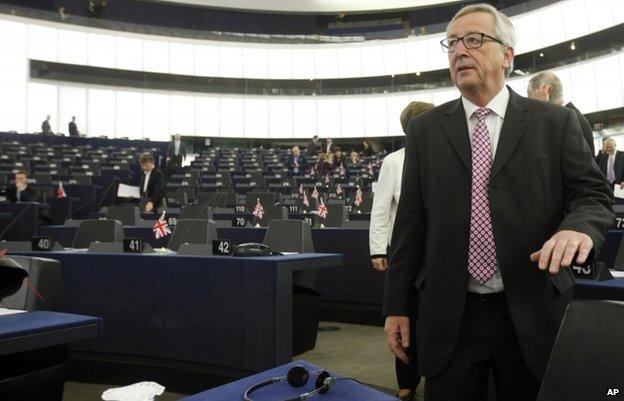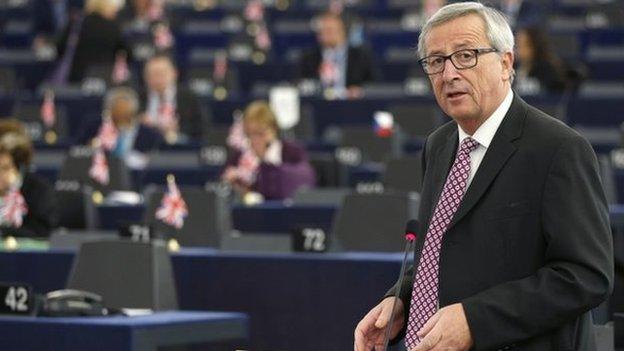Kick-starting the European economy
- Published
- comments
Jean-Claude Juncker: ''It is a question of getting some new winds blowing through Europe... some fresh air into the structures"
The President of the European Commission, Jean-Claude Juncker, unveiled his big plan, external today to boost the European economy. "Europe needs a kick-start," he said, "and the Commission is applying the jump leads".
The aim is to get the private sector to start investing again in Europe.
So the EU Commission is setting up a €315bn (£250bn; $393bn) investment fund. It will be backed by €16bn from the EU budget and €5bn from the European Investment Bank (EIB).
The aim will be to leverage these funds to provide both guarantees and seed money to attract private investors. The Commission was claiming today that for every €1 given, €15 would be created.
It is an ambitious project, intended to create a million jobs.
Potential investors will get advice on which sectors to invest in, but the focus is expected to be on transport, energy and digital projects.
During the eurozone crisis, private investors have sat on their hands. Private investments have fallen by hundreds of billions of euros in the past few years.

The Commission's plan will depend on whether investors see Europe as an opportunity
Mr Juncker says "investors lack confidence, credibility and trust". Now, for riskier investments, they will be granted some protection against losses.
The Socialists were delighted, describing the fund as a "turning point".
The head of the Socialist group, Gianni Pittella, said: "From the blind austerity dogma of the Barroso era, we are now moving to a new phase focused on investment, jobs and growth."
Others were less convinced. Dimitris Papadimoulis of the European United Left said there was "not one euro of fresh money in there, external".
"It is a farce, it's re-cycling and re-labelling," he said.
It is unclear how much money governments will contribute. They are being offered a concession: contributions to new investment funds will be deducted from calculations of their deficits. But the Commission has described this plan as "mobilising private capital without creating any new debt".
The fund is backed by the all-important German government and Chancellor Angela Merkel.
"The German government supports in principle the package submitted," she said.
But there was a note of caution. "Investment is important, but what's important above all is what projects" are invested in.
This is the new Commission's big idea. It is the EU's New Deal.
To a large extent it will be judged by its success or failure.
The markets are currently awash with money. The big test is whether they will invest in Europe where the economy is stagnating and confidence is low.
To many investors, Europe has appeared an unattractive investment.
If that remains the case then this plan will fail, for it depends on the private sector providing most of the money.
- Published26 November 2014
